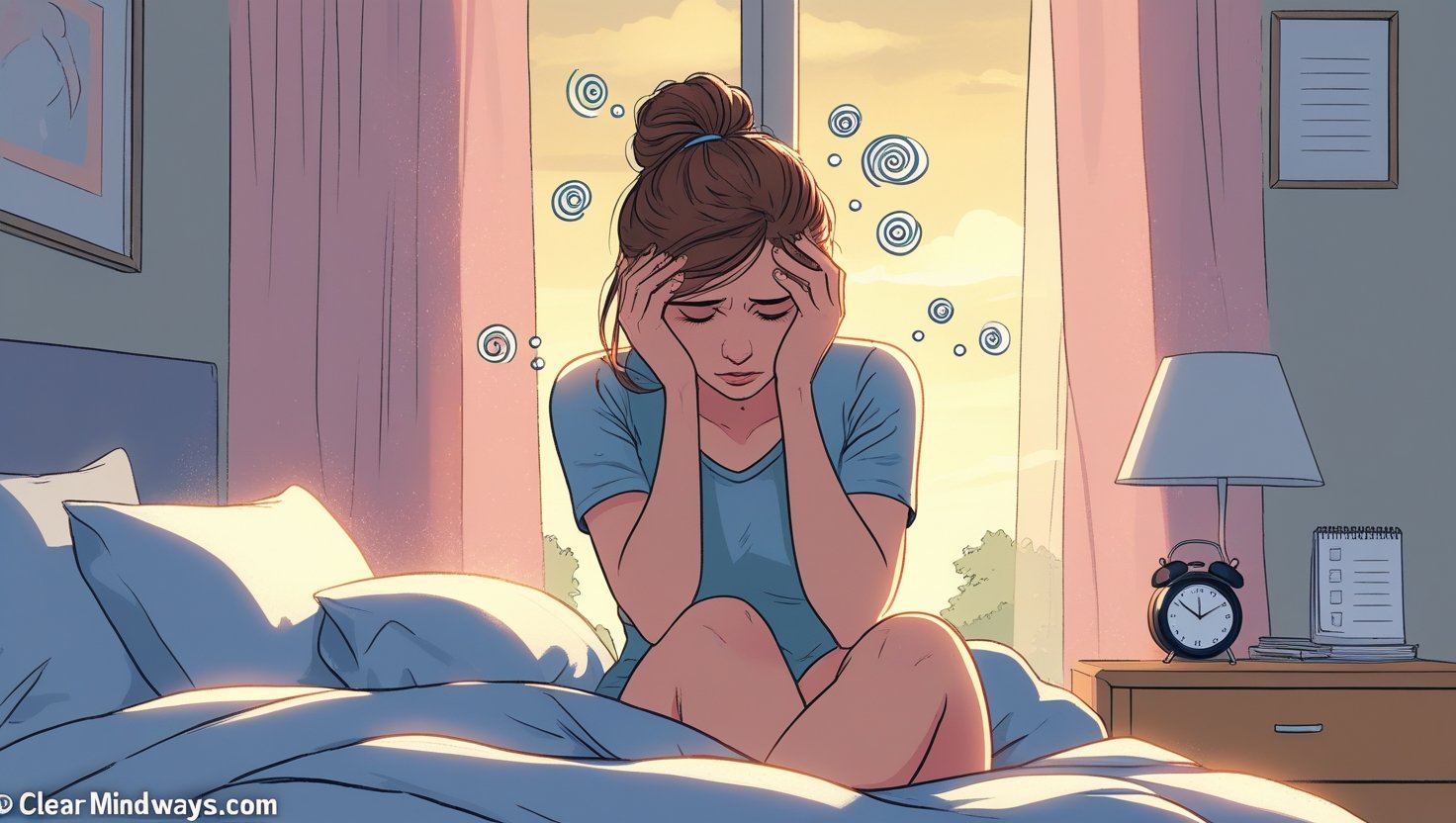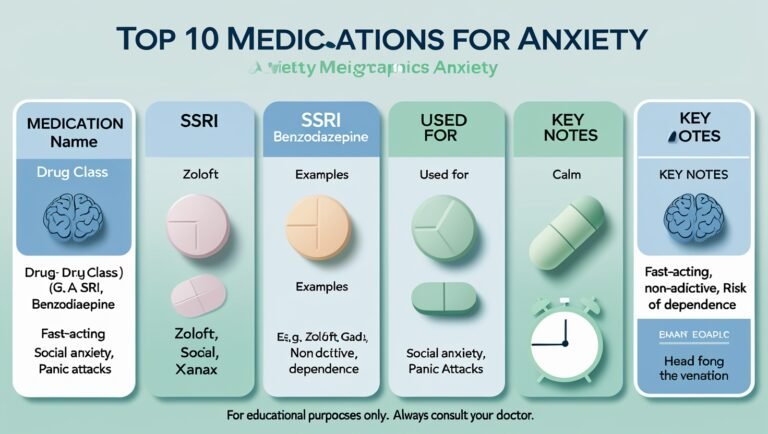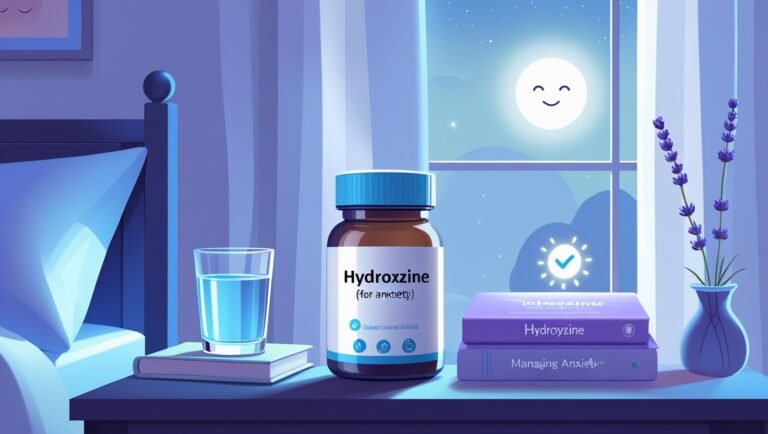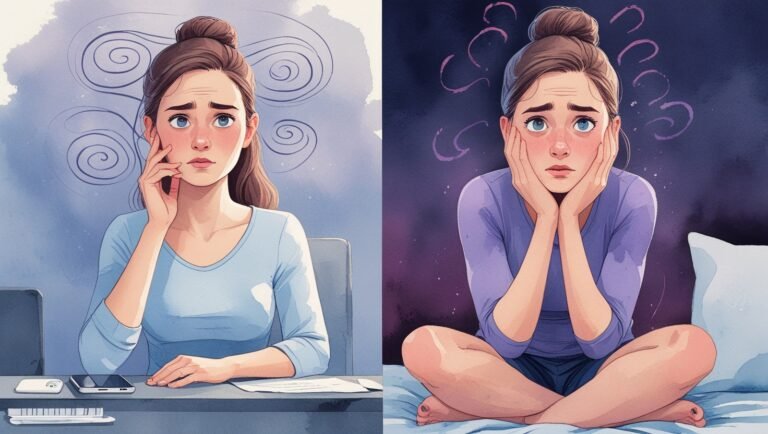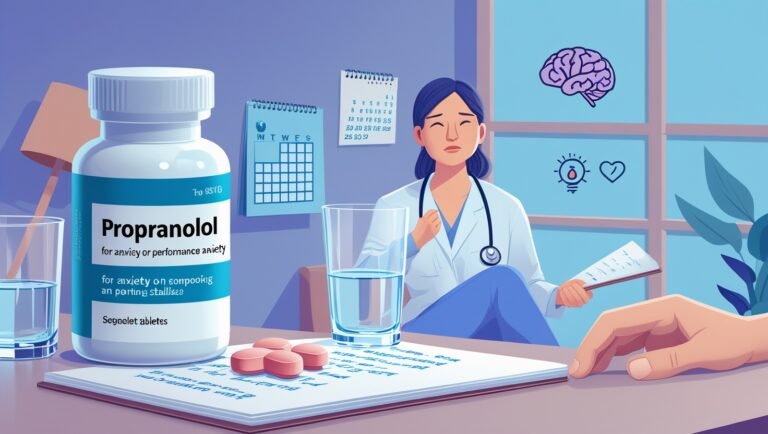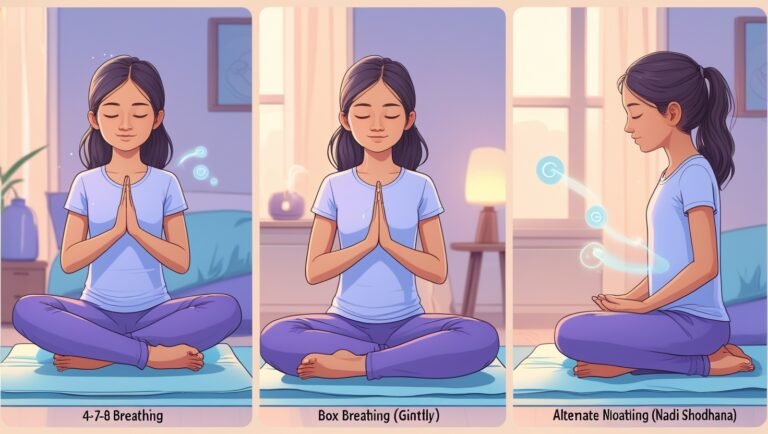Morning Anxiety: Causes, Triggers, and Treatments
I used to dread mornings. The instant I opened my eyes, this wave of panic would slam into me like a Mack truck. My heart would be racing, my stomach twisted in knots, and I felt like I was drowning before I’d even had a chance to get out of bed. Sound familiar?
If you are reading this, you most likely have experienced what I am referring to. Morning anxiety is a terrible thing and it impacts so, so many more people than you realize. And honestly? It sucks. But here’s what I’ve learned after hearing thousands of stories from people just like you – it doesn’t have to be like this forever.
I’m not here to soften this message, to say that there’s some magic cure that’s going to fix everything and fix it fast. But I can offer what has actually worked for me, as well as the thousands who have been in your shoes. These are not just random tips I happened to find on the internet –– they are real strategies that can truly transform the way you start your day.
Related: 10 Practical Tips to Stop Procrastinating
What is morning anxiety?
Morning anxiety is pretty much when you wake up in the morning and feel like crap. Not even tired or groggy – anxious. As in, before you’ve even had time to determine what day it is, your body goes tumble weeding into all-out fight-or-flight mode.
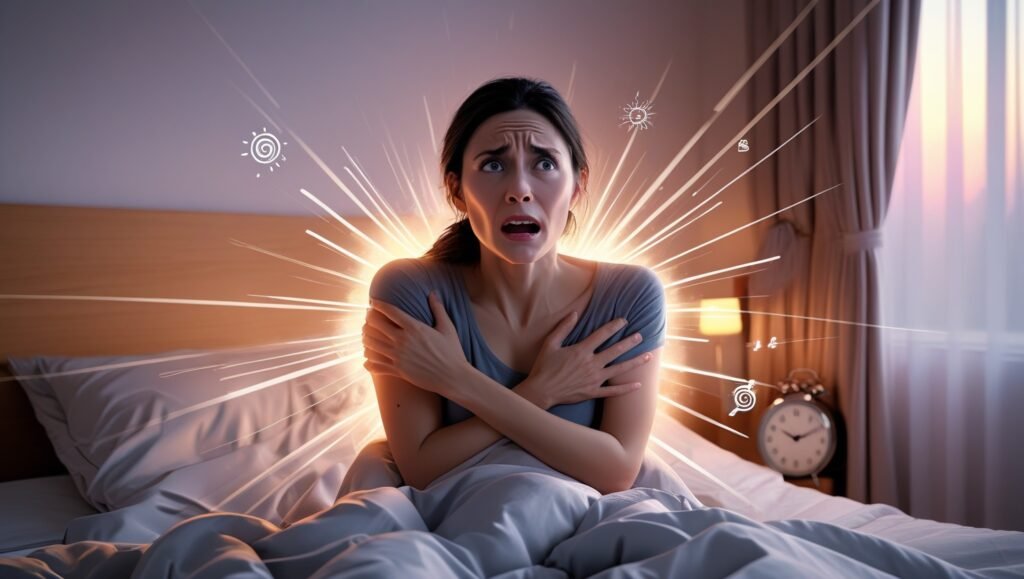
It’s not, in itself, a medical diagnosis, but believe me, it’s real. Other people are struck with full-blown panic attacks. Others just have this constant sense of foreboding or anxiety that makes it feel impossible to get out of bed. And then there are people who feel physically ill — nauseous, shaky, like they’re coming down with something, except that something is just anxiety.
Morning anxiety is so brutal largely because of its timing. You’re not even awake enough to do your normal coping. You’re not even awake yet, haven’t even taken your coffee, and bam – anxiety washes over you like a tidal wave.
There were times I’d wake up in bed, certain I needed to get up, but feeling totally unable to move. My mind would automatically ruminate on everything that could go wrong that day, everything I would have to do, every problem I would have to solve. That was tiring as hell, even before the day began.
Morning anxiety symptoms
Morning anxiety manifests differently for everyone, but there are some pretty common symptoms. Here’s the kind of thing you might find yourself going through:
Physical Symptoms
| Symptom | What It Feels Like |
|---|---|
| Racing heart | Heart pounding like you just ran a marathon, even while still in bed |
| Nausea | Feeling like you’re going to throw up, making breakfast impossible |
| Excessive sweating | Waking up drenched in sweat or sweating when thinking about the day |
| Muscle tension | Tight shoulders, neck, or clenched jaw – like your body prepared for battle all night |
| Shortness of breath | Feeling like you can’t catch your breath or take a deep breath |
| Shakiness | Hands trembling or feeling unsteady on your feet |
Mental & Emotional Symptoms
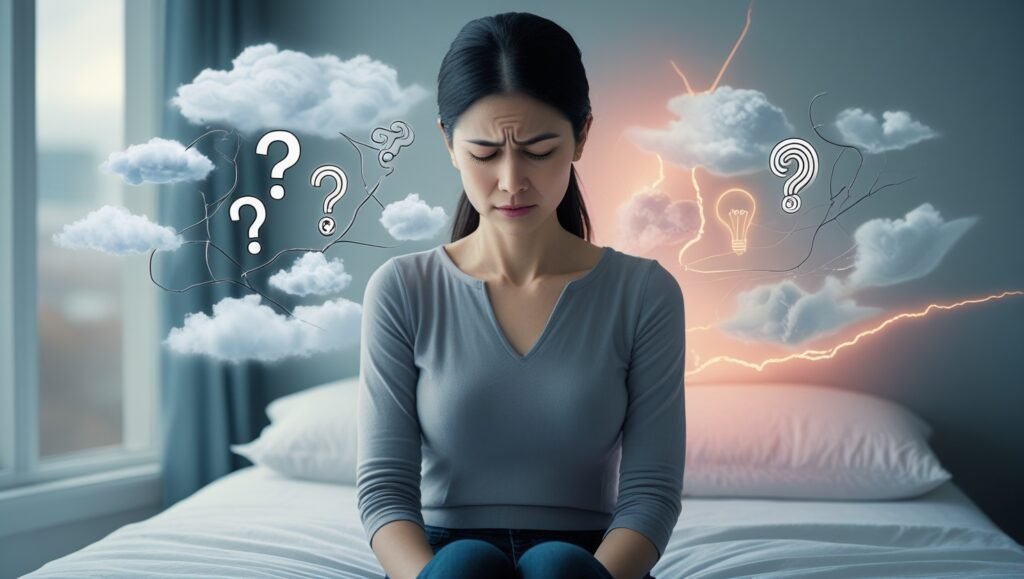
Racing Thoughts Your mind bounces from worry to worry like a pinball machine on fast forward: “Did I get that project done? What if I’m late? What if something goes wrong today?”
Existential dread – Just feeling like the day is going to be shit before you have even left your bed even though you have no stressors planned that day.
Feeling irritable – Small things that would normally not irritate you become the worst thing in the world
Brain fog – can’t think straight, confused or trouble making simple decisions.
Doom and gloom – The feeling that something bad is going to happen without a specific reason of what this will be up
Shame and guilt –Let’s feel bad about feeling anxious, there are way worse things we could be happening to right? opening the door to a vicious cycle.
Why do I get morning anxiety?
Why this happens and what it really is was huge for me because it was like, this thing is natural to me, it’s not that I’m broken or crazy or anything—it actually serves a purpose.
Biological Factors
| Factor | How It Affects You |
|---|---|
| Cortisol spike | Your body naturally produces more stress hormone in the morning to help you wake up, but it can trigger anxiety instead. |
| Low blood sugar | After fasting all night, low blood sugar causes shakiness and rapid heartbeat that mimics anxiety. |
| Sleep hormones | Disrupted melatonin and other sleep hormones can leave you feeling unbalanced. |
Lifestyle Triggers
- Terrible sleep - Your mind processes stress incorrectly so you get mental fog
- Bedtime routines – Checking phones before bed, late caffeine (obvs), worrying yourself to sleep
- Dawn of the dead-‘I’m late for everything’ Sleep-in every morning >builds a belief to expect stress
- Caffeine timing – Late coffee means staying wired, sleep disturbances
- Screen time – Blue light, but also exciting content before bed; on the ability to sleep and sleep quality
Psychological Factors
- Anticipatory anxiety – Your brain begins to work before you’re even awake, reviewing everything you need to do that day
- Unresolved stress – Problems at work, in a relationship, or with life in general that your brain immediately jumps to
- Negative thinking – Repetitive worry cycles once you wake up
- Perfectionism – The idea that everything must be figured out before the day begins
Tips for coping with morning anxiety
All right, the good news — what actually works. It’s not that these are miracle cures, I’m not going to paint them that way, but they can really help you feel better in the mornings if you’re consistent.

Add calming rituals to your bedtime routine
This was the one I think really made the most difference for me. What you do in the hours leading up to bed is going to directly impact how you feel when you rip that sheet off of yourself in the early hours, and your bedtime routine better be good if you have any hope of actually relaxing.
Essential Bedtime Routine Elements
| Time | Activity | Why It Helps |
|---|---|---|
| 2 hours before | Stop work/stressful activities | Gives your mind time to decompress |
| 1 hour before | Begin wind-down routine | Signals your body it’s time to relax |
| 30 minutes before | No screens, dim lights | Protects natural melatonin production |
| Right before bed | Brain dump in journal | Clears racing thoughts |
Calming Activities to Try:
Hot shower or bath: The heat from the hot shower will help to relax tight muscles, and the cooling after the shower brings on sleepiness.
Stretching or Yoga – Help relieving tension in the body from the day, and stepping into relaxation.
Book – Ideally one with hard cover, something easy not too heavy and stimulating.
Chamomile - Caffeine free with natural relaxing properties
Journaling - Journal tomorrow’s to do list, what’s on your mind, or what you’re thankful for.
Deep breathing or meditation — A few minutes of either can help!
Relaxing music; sleep stories – Apps like Calm have some great stuff for lulling you to a dream state.
Creating Your Sleep Environment:
- Keep your bedroom cool (65-68°F)
- Use blackout curtains or eye mask
- Try white noise machine or earplugs
- Comfortable mattress and pillows
- Remove clutter for a peaceful space
Avoid screens before bed
This one was tough for me since looking at my phone in bed had become something of a reflex. But the blue light emitted by screens really screws with your sleep, and the content you consume right before bed can get lodged in your subconscious and manifest in your dreams and morning mood.
Aim to stash every screen at least an hour before bed. If you rely on your phone to wake up, buy an old-fashioned alarm clock so you can charge your phone away from the bedroom. This also means you can’t reach for it first thing when you wake up, and risk setting off anxiety with emails or news.
If you must use a device, there are also blue light blocking glasses or apps that filter the light, but really, it’s best to make sure you’re unplugged during that wind-down time at night.
Fill it instead with relaxing pursuits. Read an actual book, listen to soothing music, try some gentle stretching or practice deep breathing. Your brain needs time to respond from the day’s stimulation to the relaxation of sleep.
Cut back on caffeine
I love coffee. I mean I love coffee a lot. But I had to admit that my caffeine habits were not helping my already worrisome morning anxiety.

How Caffeine Affects Morning Anxiety
| Timing | Impact on Sleep | Morning Effect |
|---|---|---|
| After 2 PM | Interferes with deep sleep | Increased morning jitters |
| Late afternoon | Disrupts sleep cycles | Waking up already anxious |
| Evening | Prevents proper wind-down | Racing heart upon waking |
Hidden Sources of Caffeine:
- Coffee drinks – Espresso, lattes, cold brew (80-200mg per serving)
- Tea – Black tea (40-70mg), green tea (25-50mg), white tea (15-30mg)
- Energy drinks – Can contain 50-300mg per serving
- Sodas – Coke (34mg), Mountain Dew (54mg), Dr Pepper (41mg)
- Chocolate – Dark chocolate (12mg per oz), milk chocolate (5mg per oz)
- Medications – Some pain relievers and cold medicines
Gradual Reduction Strategy:
- Week 1: Cut evening caffeine (after 6 PM)
- Week 2: Stop afternoon caffeine (after 2 PM)
- Week 3: Reduce morning amount by 25%
- Week 4: Find your optimal morning amount
Caffeine Alternatives:
- Herbal teas – Chamomile, peppermint, ginger
- Decaf coffee – Still gives you the ritual and taste
- Golden milk – Turmeric latte with anti-inflammatory benefits
- Matcha – Lower caffeine with L-theanine for calm energy
- Sparkling water – For the fizzy sensation without stimulants
Use positive affirmations in the morning
I’m just going to be honest here: I used to think positive affirmations were sorta cheesy. But when you wake up with your mind racing toward worst-case scenarios, you need something positive and grounding to redirect your focus.
The trick is to make it personal and believable. The generic “Everything is perfect” didn’t help me, because my anxious brain would just argue with all these affirmations. Instead, I tuned in to the affirmations that felt authentic and helpful.
Some of mine include: “I’ve gotten through hard days before and I can get through today,” “This feeling of worry will pass,” “I don’t need to feel perfect to have a good day” and “I can take this one moment at a time.”
I have a list of them on my phone and I go through it when I wake up feeling anxious. Some I say out loud and some I just read to myself. The idea is to crowd out worry or stress with something more constructive for your brain to grapple with instead of jumping into worry mode.
You can also customize them to certain environments. If you have a big presentation for work, maybe you use affirmations around your competence and preparation. If you struggle with relationship stress, concentrate on affirmations about your own worth and capacity to manage challenging conversations.
Try breathing exercises to ground yourself
When panic strikes, your breathing becomes shallow and rapid, which only serves to make the panic worse. It offered me some simple breathing techniques that provided a tangible way for me to respond when I had morning anxiety.

Popular Breathing Techniques
| Technique | Instructions | Best For |
|---|---|---|
| Box Breathing | In 4 – Hold 4 – Out 4 – Hold 4 | General anxiety relief |
| 4-7-8 Breathing | In 4 – Hold 7 – Out 8 | Quick calming effect |
| Belly Breathing | Deep breaths into diaphragm | Activating relaxation response |
| Extended Exhale | In 4 – Out 8 | Immediate stress relief |
Step-by-Step: Box Breathing
- Step 1: Sit comfortably or lie down
- Step 2: Breathe in through nose for 4 counts
- Step 3: Hold breath for 4 counts
- Step 4: Breathe out through mouth for 4 counts
- Step 5: Hold empty lungs for 4 counts
- Step 6: Repeat 5-10 times
When to Use Breathing Exercises:
- First thing in the morning – While still lying in bed
- During your morning routine – In the shower, making coffee
- Before stressful activities – Big meetings, difficult conversations
- Anytime anxiety spikes – On the go, no equipment needed
- Before bed – To calm racing thoughts
Tips for Success:
- Start with just 2-3 minutes daily
- Focus on the counting, not perfection
- Use apps like Breathe or Calm for guidance
- Practice when calm, not just during anxiety
- Be patient – it gets easier with time
Take on your morning one step at a time
This may be the single most important tip of all. When anxiety hits, your brain naturally wants to process everything at once – your entire to-do list for the day, every single thing you worry about, all your job duties. It’s overwhelming and drives you back under the covers.
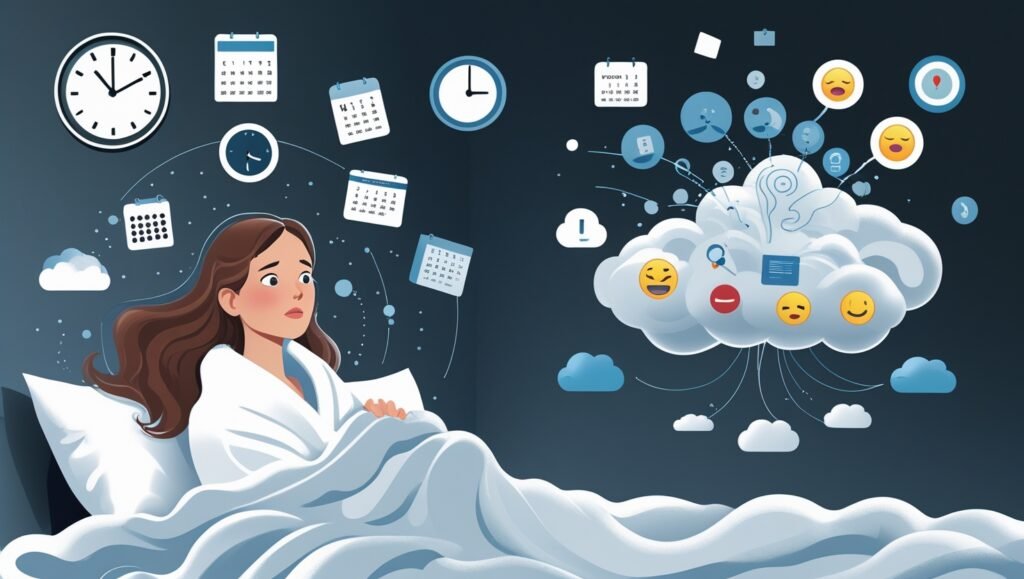
Simple Morning Routine Checklist
| Order | Task | Time Needed | Anxiety Level |
|---|---|---|---|
| 1 | Sit up in bed | 30 seconds | Low |
| 2 | Feet on floor | 30 seconds | Low |
| 3 | Walk to bathroom | 1 minute | Low |
| 4 | Brush teeth | 2 minutes | Low |
| 5 | Drink water | 1 minute | Low |
| 6 | Make coffee/tea | 3 minutes | Low |
| 7 | Eat something small | 5 minutes | Low |
The One-Step Rule:
- Focus only on the very next thing you need to do
- Don’t think about your whole to-do list
- Ignore everything that might go wrong later
- Complete each small task before moving to the next
- Celebrate tiny accomplishments
Prepare the Night Before:
- Lay out clothes – One less decision to make
- Prep breakfast items – Overnight oats, set out cereal
- Pack your bag – Keys, wallet, work items ready to go
- Set up coffee maker – Timer or just prep the machine
- Charge devices – Phone, laptop, anything you need
When Your Mind Races:
- Acknowledge the thought: “I notice I’m thinking about that meeting”
- Redirect gently: “Right now I’m just making coffee”
- Use grounding: Name 5 things you can see, 4 you can touch, 3 you can hear
- Return to task: Focus on the physical sensations of what you’re doing
Emergency Micro-Steps:
If even basic tasks feel overwhelming:
- Just breathe for 30 seconds
- Wiggle your toes while still in bed
- Count to 10 slowly
- Name 3 things you can see from where you are
- Take one sip of water
When to seek help
And just so we’re clear – if your morning anxiety is interfering with your life, I encourage you to speak with a professional. There is no shame in getting help — and it can often make all the difference in the world.
If you’re late for work every day because you’re paralyzed by anxiety and can’t make yourself function in the morning, if you’re experiencing panic attacks, if you’re avoiding commitments because mornings feel daunting, or if you’re using alcohol or other substances to manage, reach out.
“If people have been trying those things for weeks on end and there’s no improvement, a therapist can help gimmick out what else might be going on,” Damour said. Occasionally, morning anxiety can be part of a more general anxiety disorder or depressive disorder that does very well with some professional attention.
Many treatments work. Treatments such as cognitive-behavioral therapy (CBT) can work with you to create individualized ways to deal with your anxious thoughts. Sometimes medication is helpful as well, and a healthcare provider can help you decide if that’s right for you.
I had a therapist for a few months when my morning anxiety was at its peak and it was so helpful. She had me recognize patterns that I had missed, and she gave me more tools to use.”
And, keep in mind, asking for help is a sign of strength, not weakness. You are making an effort to change your life around, which is commendable.
Additional Quick Tips
Foods That Help Morning Anxiety:
- Oatmeal with berries – Slow-releasing energy, stabilizes blood sugar
- Eggs with whole grain toast – Protein and complex carbs combination
- Greek yogurt with nuts – Probiotics may help gut-brain connection
- Banana with almond butter – Natural sugars with healthy fats
- Herbal tea – Chamomile, passionflower, or lemon balm
Foods to Avoid:
- Sugary cereals – Cause blood sugar spikes and crashes
- Energy drinks – Too much caffeine and artificial stimulants
- Pastries and donuts – High sugar, low nutritional value
- Skipping breakfast entirely – Can worsen anxiety symptoms
Red Flags – Seek Help If:
- Morning anxiety prevents you from getting to work/school
- You’re having panic attacks regularly
- You’re using alcohol or substances to cope
- Thoughts of self-harm occur
- Symptoms worsen despite trying these strategies for several weeks
FQAs
Does morning anxiety mean I have an anxiety disorder now?
Not necessarily. A ton of people have morning anxiety without actually having an anxiety disorder. It might happen during times of stress or life transition. “But if it’s recurring and truly disrupting your days, it’s worth speaking to a health care professional in order to see what’s happening.
When will these measures take effect?
Everyone is different, but generally people start to see some improvement a week or two of using these techniques consistently. The breathing techniques and one-step-at-a-time methodology are often effective right away, whereas behaviors such as changing your bedtime routine may take longer to prove effective.
Is it medication that causes morning anxiety?
Yes, there are medications that can contribute to morning anxiety, particularly when you are first starting them or changing doses. If you are concerned that your medication may be implicated, speak with your doctor. Don’t just stop taking things though without help from a doctor.
Why do we feel so much more anxious in the morning?
Actually, yes. Your cortisol is going to peak in the morning naturally, and that’s what’s making people anxious – sensitive people. Also: mornings mean waking up and moving from dreamland to having to manage the demands of existing, which can be an abrupt reality check. But that’s not to say you have to accept it.
What foods can I eat for breakfast to help morning anxiety?
Reach for something with protein and complex carbs to keep your blood sugar balanced. It’s usually eggs and toast or oatmeal with nuts. Skip the sugary stuff that will send your blood sugar through the roof and then crashing. And definitely eat something even if you don’t feel like it: Skipping breakfast can exacerbate anxiety.
Should I look at my phone when I wake up?
I’d avoid it if possible. Going straight to emails, news or social media can provoke anxiety before you’ve had time to catch your breath for the day. Try to give yourself a good 30 minutes free of your phone when you first wake up.
Final Thoughts
“Now, I’m not going to sit here and tell you that having morning anxiety is easy. Some days are tougher than others, and that’s O.K. But I can tell you that it’s so much better when you have the right tools and the right strategies.
Most importantly, be patient with yourself. These things take time and progress is not always linear. (You could also have a fabulous week and then a really tough couple of days.) And that’s all totally fine.
Begin with one or two of these approaches instead, and avoid attempting too harsh of a sudden revamp to your overall regimen. Perhaps start with the breathing exercises, and over time let the other techniques else become habits.
Just remember that you are not alone in this. Morning anxiety is experienced by millions of people, and there’s no shame in finding it difficult. You’re taking steps for you to feel better, and for that you deserve to pat yourself on the back.
Your mornings don’t need to be a struggle. “I have a lot of people who cannot fall asleep that can learn how to wake up more rested,” he said. You’ve got this.
